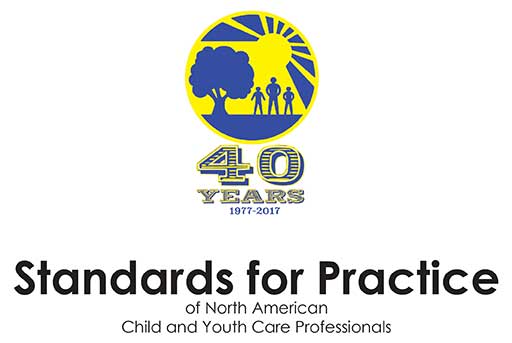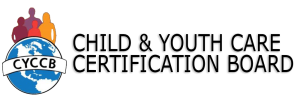Ethics

Standards for Practice of North American Child & Youth Care Professionals
© 2017 Association for Child & Youth Care Practice
These principles and standards provide a framework to guide ethical thinking and decision making across the various settings and roles in which Child and Youth Care Professionals serve.
Professional Child and Youth Care is committed to promoting the well being of children, youth, and families in a context of respect and collaboration. This commitment is carried out in a variety of settings and with a broad range of roles including direct practice, supervision, administration, teaching and training, research, consultation, and advocacy. In the course of practice Child and Youth Care Professionals encounter many situations which have ethical dimensions and implications.
As Child and Youth Care Professionals we are aware of, and sensitive to, the responsibilities involved in our practice. Each professional has the responsibility to strive for high standards of professional conduct. This includes a commitment to the centrality of ethical concerns for Child and Youth Care practice, concern with one’s own professional conduct, encouraging ethical behavior by others, and consulting with others on ethical issues.
This ethical statement is a living document, always a work in progress, which will mature and clarify as our understanding and knowledge grow. The principles represent values deeply rooted in our history, to which there is a common commitment. They are intended to serve as guidelines for conduct and to assist in resolving ethical questions. For some dilemmas, the principles provide specific or significant guidance. In other instances, the Child and Youth Care Professional is required to combine the guidance of the principles with sound professional judgment and consultation. In any situation, the course of action chosen is expected to be consistent with the spirit and intent of the principles.
The Standards for Practice were originally adopted by the Association for Child and Youth Care Practice (ACYCP) in 1995. The standards were revised by an ACYCP ad hoc committee in 2016-2017 and adopted by ACYCP June 2017.
Principles and Standards
I. Responsibility for self
- Demonstrates high standards of integrity and professional conduct
- Develops knowledge and skills necessary to benefit children, youth, and families
- Participates in education and training for ongoing professional development
- Engages in ongoing supervision and/or counsel as appropriate
- Maintains physical and emotional well-being
- Aware of personal values and their implication for practice
- Mindful of self as a growing and developing practitioner
- Understands the importance of self-care and the responsibility to seek guidance, counseling, and support
II. Responsibility to children, youth and families
- Does not cause harm
- Encourages safe and ethical practice
- Does not disrespect, exploit, or intimidate others
- Maintains privacy and confidentiality as appropriate to role
- Ensures services are culturally sensitive and non-discriminatory (regardless of race, color, ethnicity, national origin, national ancestry, age, gender, sexual orientation, marital status, religion, mental or physical capacity/ability, medical condition, political views, or socioeconomic status)
- Provides protection and advocacy
- Recognizes, respects, and advocates for the rights of the child, youth and family
- Supports individuals in advocating for their own rights and safety
- Fosters self-determination and personal agency
- Encourages a child or youth’s participation within a family and community, and facilitates the development of social networks
- Recognizes the life space of young people involves physical, emotional, mental and virtual domains (including social media, messaging, gaming, etc.)
- Respects the diversity of life patterns and expectations
- Affirms that there are differences in individual and family needs and meets those needs on an individual basis
- Ensures interactions reflect developmental age, status, understanding and capacity
- Adapts to individual needs when designing and implementing plans and programs (including psychological, physical, social, cultural, and spiritual needs)
- Values collaboration with colleagues and those from other disciplines
- Makes referrals to other professionals as necessary and seeks assistance to ensure access to needed services
- Observes, assesses, and evaluates services/treatments prescribed or designed by other professionals
- Ensures appropriate boundaries between professional and personal relationships
- Recognizes and adjusts for dynamics related to power, authority, and position
- Does not engage in harassment or sexual misconduct with a child, youth, or family member
III. Responsibility to the employer and/or employing organization
- Responds to employer in a professional manner and seeks to resolve differences collaboratively
- Treats colleagues with respect, courtesy, and equity
- Models flexibility and inclusiveness in working with colleagues and family members
- Respects the commitments made to the employer or employing organization
IV. Responsibility to the profession
- Acts in a professional manner toward colleagues
- Seeks arbitration or mediation with colleagues as appropriate
- Reports ethical violations to appropriate individuals or boards when informal resolution is not appropriate or sufficient
- Encourages collaboration among professionals, children, youth, family and community to share responsibility for outcomes
- Ensures professional practice in training and research activities
- Ensures education and training programs are competently designed and delivered
- Ensures research is of high quality and is designed, conducted, and reported in accordance with quality and ethical standards
- Ensures that practitioners, supervisors and administrators lead programs according to high-quality and ethical practice
V. Responsibility to the community
- Promotes awareness of the profession and the needs of children, youth, and families to the community
- Models ethical behavior in relationships and interactions with community members
- Promotes respect and appreciation of diversity, racial equality, social justice and cultural humility
- Encourages informed participation by the public in shaping social policy and decisions affecting children, youth, and families
Revision Committee Members (2016-2017)
James Freeman, MA, CYC-P - Immediate Past President, CYCCB; Chair, ACYCP Ad Hoc Ethics Revision Sub-Committee (March 2016 - June 2017) Camarillo, California
Christina Scanlon, - Co-Chair, ACYCP Training and Research Committee; Delegate at Large, ACYCP Board, Pittsburgh, Pennsylvania
Frank Eckles, BA, CYC-P - Co-Chair, ACYCP Training and Research Committee; Second Vice President, ACYCP; Past President, CYCCB, College Station, Texas
TC Cassidy, MPA, M.Div., CYC-P - Delegate at Large, ACYCP Board, Chattanooga, Tennessee
John Korsmo, Ph.D. - Past Delegate at Large, ACYCP Board; Faculty, Western Washington University, Bellingham, Washington
Jeff Reid, M.Ed., CYC-P - President, CYCCB; Council of Canadian CYC Associations Representative, ACYCP Board, Truro, Nova Scotia
Andrew Schneider-Munoz, Ed.D., CYC-P - Past President, ACYCP; Past Board Member, CYCCB, San Diego, California
